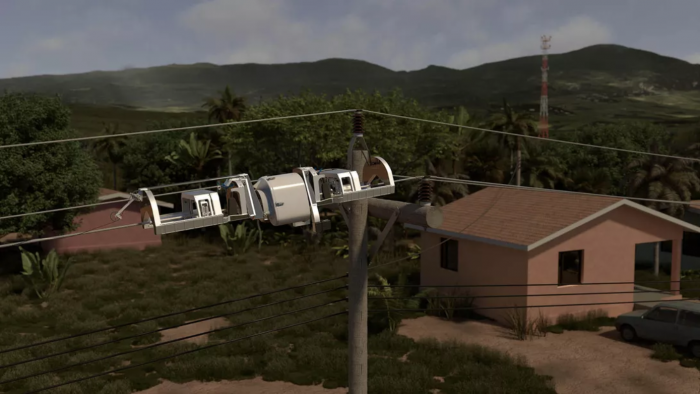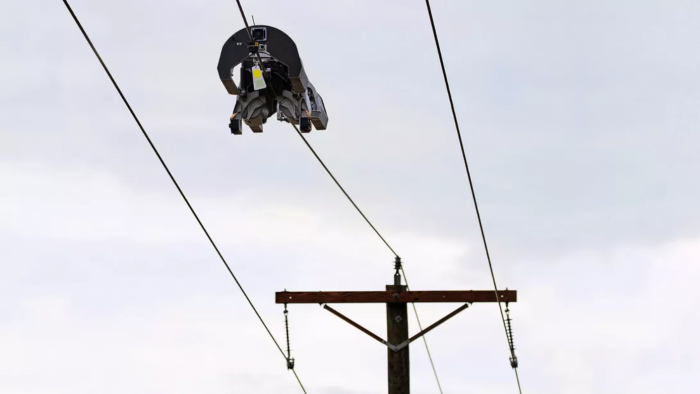Fan Cheng Facebook creates the aerial silkworm baby robot to make the Internet faster and chea
Published on:2020-07-22
According to foreign media reports, Facebook recently designed and developed a robot for use in the air, which can make network communication cheaper. According to reports, this kind of robot will be cleverly hung on a power line to maintain balance at a high place above the ground, which looks almost like floating. Like a tightrope walker, the robot will gradually move forward and leave a string of steel cables behind it. When it touches a pole, it will gracefully raise its body, pass through the barricade, and then move on.

It is understood that the robot will be installed on medium voltage wires. Its purpose is to enable Internet service providers to use ultra fast and reliable optical fiber connections to build networks, so as to reduce costs. We know that installing optical fiber is an expensive work, which limits its coverage. Facebook said that if the installation cost decreases, the service cost of end users will also decrease.
Facebook and its CEO and founder Mark Zuckerberg have been hoping to expand Internet access. The fiber-optic installation robot, code named Bombyx, which means silkworm in Latin, and the thinner fiber-optic cable installed in the machine are part of promoting this goal. The robot crawled along the transmission line and wound its streamlined optical fiber cable around the wire already in place. Facebook said that by using the existing power infrastructure, this will greatly reduce the cost of fiber deployment.

The social networking giant plans to obtain a non exclusive license for the technology and will launch a pilot project with its partners next year. It is reported that Facebook will not manufacture this robot, but choose to rely on partner production and external sales.

Karthik yogeeswaran, a wireless systems engineer and head of Bombyx in the Facebook connectivity group, said that half of the worlds population is not connected. About 80% of these people use the existing 3G or better network, but they still cant get online because they cant afford the network cost. In addition, he said, "fiber bandwidth is basically several orders of magnitude higher than any other technology. We want more people to have more data."
When operators are busy launching ultra-high-speed 5g wireless services, the Internet speed in many parts of the world is still very slow, and 3.5 billion people still cant get online at all. The COVID-19 pandemic makes the demand for high-speed and broadband Internet more obvious. In some places, hospitals, schools and other important organizations do not have the Internet fast enough to keep them running. Because people work from home, they need a stable Internet connection to complete their tasks. At the same time, children also need the Internet to complete their digital courses. If there is no Internet connection, all this is empty talk, which is bad for people who live where there is no reliable and fast Internet connection. Facebook is difficult to help in many other areas, but it hopes to succeed in many other areas.
In the United States, the federal and state governments have provided billions of dollars to enterprises to build high-speed optical fiber networks, but the installation cost is not only expensive but also very time-consuming. Digging the ground and laying optical fibers costs tens of thousands of dollars per mile. In emerging markets, the problem of insufficient broadband access is more prominent. Even if the service is available, it is too expensive for many people to use.
Considering all the controversy surrounding the company, the timing of Facebook announcing the news may be surprising, but it is necessary to point out that the plan to expand the Internet connection before the COVID-19 started to spread around the world began. The company envisages connecting the whole world to the Internet. Projects developed by the company include applications that transmit drones over the Internet and allow users to browse text on any mobile website for free.

It is understood that the robot will be installed on medium voltage wires. Its purpose is to enable Internet service providers to use ultra fast and reliable optical fiber connections to build networks, so as to reduce costs. We know that installing optical fiber is an expensive work, which limits its coverage. Facebook said that if the installation cost decreases, the service cost of end users will also decrease.
Facebook and its CEO and founder Mark Zuckerberg have been hoping to expand Internet access. The fiber-optic installation robot, code named Bombyx, which means silkworm in Latin, and the thinner fiber-optic cable installed in the machine are part of promoting this goal. The robot crawled along the transmission line and wound its streamlined optical fiber cable around the wire already in place. Facebook said that by using the existing power infrastructure, this will greatly reduce the cost of fiber deployment.

The social networking giant plans to obtain a non exclusive license for the technology and will launch a pilot project with its partners next year. It is reported that Facebook will not manufacture this robot, but choose to rely on partner production and external sales.

Karthik yogeeswaran, a wireless systems engineer and head of Bombyx in the Facebook connectivity group, said that half of the worlds population is not connected. About 80% of these people use the existing 3G or better network, but they still cant get online because they cant afford the network cost. In addition, he said, "fiber bandwidth is basically several orders of magnitude higher than any other technology. We want more people to have more data."
When operators are busy launching ultra-high-speed 5g wireless services, the Internet speed in many parts of the world is still very slow, and 3.5 billion people still cant get online at all. The COVID-19 pandemic makes the demand for high-speed and broadband Internet more obvious. In some places, hospitals, schools and other important organizations do not have the Internet fast enough to keep them running. Because people work from home, they need a stable Internet connection to complete their tasks. At the same time, children also need the Internet to complete their digital courses. If there is no Internet connection, all this is empty talk, which is bad for people who live where there is no reliable and fast Internet connection. Facebook is difficult to help in many other areas, but it hopes to succeed in many other areas.
In the United States, the federal and state governments have provided billions of dollars to enterprises to build high-speed optical fiber networks, but the installation cost is not only expensive but also very time-consuming. Digging the ground and laying optical fibers costs tens of thousands of dollars per mile. In emerging markets, the problem of insufficient broadband access is more prominent. Even if the service is available, it is too expensive for many people to use.
Considering all the controversy surrounding the company, the timing of Facebook announcing the news may be surprising, but it is necessary to point out that the plan to expand the Internet connection before the COVID-19 started to spread around the world began. The company envisages connecting the whole world to the Internet. Projects developed by the company include applications that transmit drones over the Internet and allow users to browse text on any mobile website for free.

